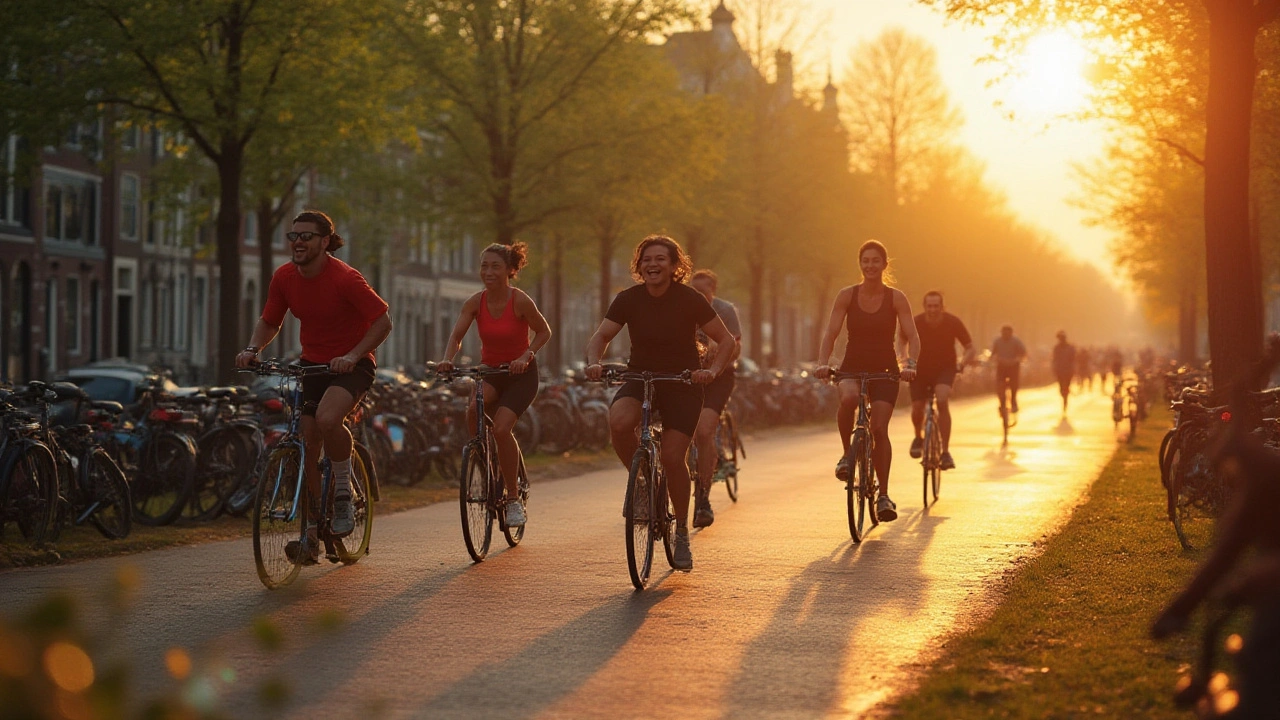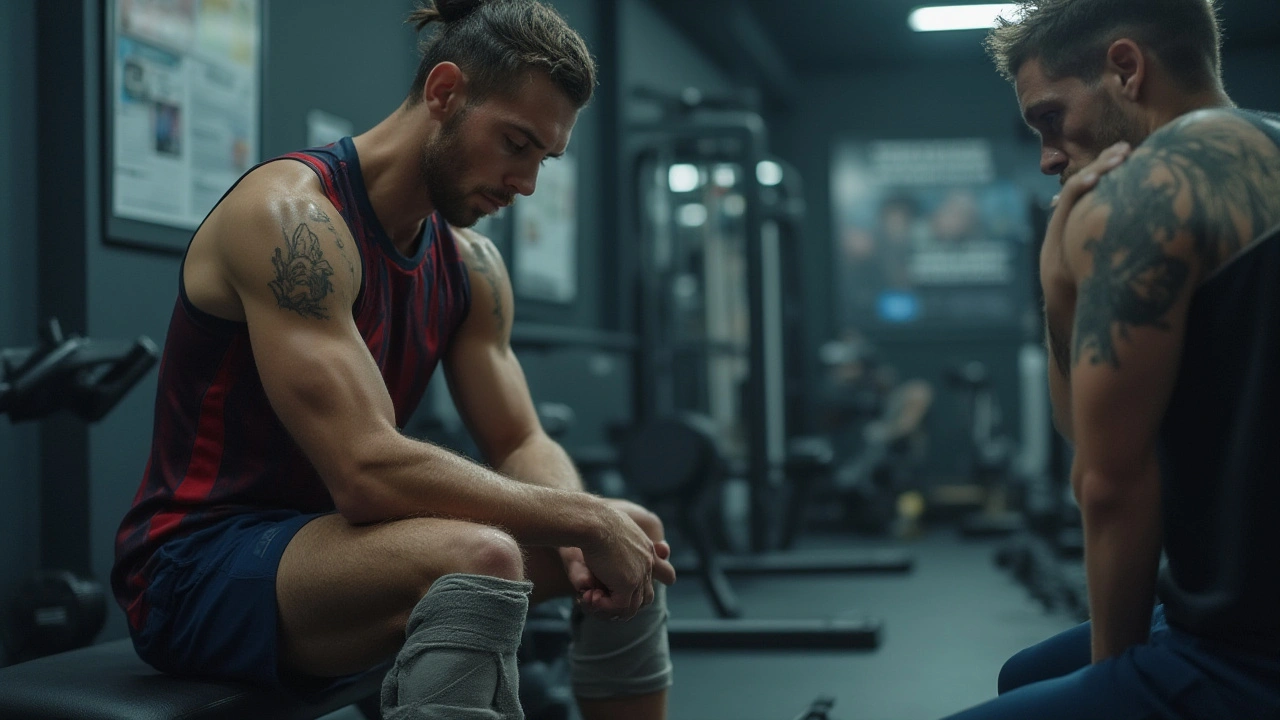Deep Tissue Massage for Athletes: Benefits, Tips & Best Amsterdam Studios

Key Points
- Deep tissue massage goes beyond relaxation—it's a game-changer for athletic performance and injury recovery.
- It targets deep layers of muscle and connective tissue, easing pain, knots, and tightness from intense training.
- Sessions can help reduce inflammation, improve flexibility, and slash recovery times for athletes.
- In Amsterdam, there are top studios and therapists specializing in sports and deep tissue massage tailored for athletic needs.
- You’ll find tips for finding the best studios, what happens during a session, safety tips, and honest advice on pricing right here.
Direct Answer
Deep tissue massage helps athletes by breaking down stubborn muscle tension, speeding up recovery from injuries, and supporting peak performance. It’s perfect if you struggle with soreness after tough workouts, feel plagued by muscle knots, or want to move better and recover faster. In Amsterdam, you can book specialized deep tissue sessions at several top massage studios, with prices ranging from €55 to €120 for an hour. With the right therapist, you’ll notice less stiffness, quicker healing, and easier workouts—not just a temporary good feeling, but lasting change.
Comprehensive Guide to Deep Tissue Massage for Athletes
Ever pushed yourself in training, only to wake up the next day so sore you’re considering taking up chess instead? That’s where deep tissue massage steps in. It’s not your typical fluffy spa massage. Instead, this is a treatment that works deep into the muscular and connective tissues, untying those knots and tackling pain in a way that makes your muscles feel like new. In Amsterdam, whether you’re cycling the canals, running marathons, or just getting started at the gym, athletes of all levels are turning to deep tissue massage for relief and results. The Dutch sporting scene—famous for football, cycling, and of course, speed skating—demands fast, reliable recovery options. Regular massages aren’t just for the elite anymore; you’ll spot amateur racers, footballers, and personal trainers lining up for their sessions.
Research from the British Journal of Sports Medicine found that deep tissue massage can lead to measurable reductions in muscle soreness after exercise. Another study by the American Massage Therapy Association showed that people who received sports or deep tissue massage experienced improved muscle flexibility and quicker recovery times. That’s no small thing in a city like Amsterdam, where fitness is part of daily life. Not only does deep tissue massage lighten the pain load, but it also enhances athletic performance by helping muscles function at their best. If you’re facing chronic aches or battling an old injury, massage studios in Amsterdam have specialists trained to work with athletic injuries, muscle strains, and even post-surgery recovery.
What really sets deep tissue massage apart is the pressure and skill. Therapists use slow, firm strokes—sometimes with their elbows or forearms—to get deep beneath the outer layers. This isn’t just about force; it’s about technique, which is why finding an experienced sports massage therapist is important. Many therapists here are trained to spot imbalances and adjust techniques for each body zone. That could mean focusing on hamstrings for runners, shoulders for rowers, or backs for cyclists. In a city that never stops moving (quite literally), having a reliable path to recovery can turn the difference between long-term progress and being benched with an injury.
Definition and Context: What is Deep Tissue Massage for Athletes?
So, what makes deep tissue massage different from a classic Swedish rubdown? The main goal is to go beneath the superficial muscles and fascia—those thin layers of connective tissue—right into the deeper structures where chronic tension likes to hide. If muscles were a city, deep tissue would be the metro, running below the surface where a lot of activity happens. This kind of massage uses slow, sustained pressure with the hands, elbows, or specialized tools, working out knots and realigning the muscle fibers that often get bunched together from overuse or injury.
The context for athletes is crucial. Anyone who trains hard knows about tight muscles, overuse injuries, and the kind of muscle stiffness that laughter turns into agony. Deep tissue massage isn’t just soothing—it’s therapeutic. It’s designed to break down adhesions (fancy term for muscle knots), flush out lactic acid, and get blood flowing to strained parts—literally helping the body repair itself faster. A lot of athletes book sessions as part of their week, just like strength training and stretching. Serious runners in Amsterdam’s Vondelpark, gym goers at Oost, and rowers at the Amstel know that getting professional help to keep their bodies tuned isn’t a luxury—it’s how you keep pace with your next personal best.
Interestingly, this study from 2023 tracked Dutch amateur cyclists and found that those receiving regular deep tissue treatment finished long rides with less soreness compared to a control group. The massage itself isn’t always painless—it can be intense, especially around very knotted or damaged spots. Massage therapists often check in about pressure, so don’t be shy to ask for adjustments. Amsterdam studios excel at customizing sessions, with some even focusing exclusively on athletic recovery. This way, every visit moves the needle for your sporting goals, not just your stress levels.
Benefits of Deep Tissue Massage for Athletes
It’s easy to think of massage as an occasional treat, but for athletes, it’s often life changing. The top benefit you’ll notice after a deep tissue session is pain relief—like that stubborn hamstring or sore shoulder finally feeling mobile again. But the perks don’t stop there. Regular sessions help reduce inflammation, which is the root of a lot of injuries and chronic pain. That means less downtime, more intense workouts, and fewer visits to the physio.
Let’s get specific. Here are some benefits you can actually feel and measure:
- Speeds up muscle recovery by improving blood flow and boosting healing of tiny muscle tears.
- Eases chronic pain caused by injuries or repetitive movements (think: tennis elbow, runner’s knee, post-match soreness).
- Improves joint flexibility—so you can squat deeper, run longer, and stay active for years.
- Breaks up scar tissue, which is huge after surgery or serious strains—helping tissue heal stronger, not just faster.
- Decreases the body’s stress hormone (cortisol), meaning you sleep better and perform better under pressure.
Real-world case? Ajax footballers famously use deep tissue sessions during their training cycles, helping players return faster from groin injuries and hamstring strains. You don’t have to play for Ajax to see results though—plenty of amateur athletes notice improvements after just one session. Many runners prepping for the Amsterdam marathon, for instance, swear by a monthly treatment for staving off knee pain and calf tightness. Stats back this up—a 2023 sports therapy survey in the Netherlands found athletes who had regular deep tissue massage missed 30% fewer training sessions due to muscle pain compared to those who didn’t. That’s a major edge if you’re working towards a goal.
Types of Deep Tissue Massage Available in Amsterdam
Walk through Amsterdam and you’ll spot a wide range of massage studios. But not all deep tissue sessions are the same. Some places focus on general deep tissue techniques, while others add “sports massage” options that blend deep pressure with stretching or trigger point therapy. Here’s what’s out there:
- Classic Deep Tissue Massage: Focuses on muscle tension and knots using slow, deliberate pressure.
- Sports Massage: A combination of deep tissue and stretching, perfect before or after big events.
- Trigger Point Therapy: Zeroes in on exact areas of chronic pain or knots that radiate pain elsewhere.
- Active Release Technique: Combines massage with movement—great for breaking up scar tissue and improving mobility in stubborn places like shoulders or hips.
- Myofascial Release: Works on the connective tissue around muscles, not just the muscles themselves—ideal for stiff backs and necks.
Many studios in the Jordaan, Oost, and De Pijp neighborhoods offer specialized sports massage therapists who understand the demands of different athletic backgrounds. For example, some are trained to help cyclists deal with lower back tension, while others work with runners on IT band syndrome (that tight spot on the outside of your thigh). When booking, check therapist bios for sports backgrounds—it can make a difference in the results you get. Also, look for studios with certifications from the Netherlands Massage Federation or European Massage Therapy Association, as they set the standard for safety and expertise.

How to Find Deep Tissue Massage Services in Amsterdam
If you’re thinking of booking your first session, it helps to know where to look. Google searches like “deep tissue massage Amsterdam” or “sports massage studio near me” usually reveal dozens of choices, but not all studios are created equal. Start by checking reviews on platforms like Treatwell, Google Maps, and local favorites like Amsterdam’s “Massage Guide.” Look for studios that clearly list deep tissue or sports massage services, with detailed therapist profiles.
Want to save time? Here’s how you can spot a quality deep tissue massage therapist in Amsterdam:
- Look for studios with verified, experienced therapists (ideally with sports backgrounds).
- Check for flexible booking (online booking is quick and easy in almost all major studios by 2025).
- Good massage studios often list their techniques and explain the difference between types of massage (avoid those who only offer “one fits all” service).
- Ask if therapists customize for sports injuries or increased intensity—it matters!
Where are most quality deep tissue massage studios in Amsterdam? You’ll find clusters in Jordaan (urban trendy with top-rated therapists), De Pijp (the yoga and wellness hotspot), and Zuid (catering to a business and expat crowd). Each neighborhood has its flavor, but the best ones usually let you book online, state their prices up front, and allow for last-minute rescheduling—handy if your training schedule changes. If you’re unsure, don’t hesitate to ask for therapist credentials or call in advance to discuss your needs.
What to Expect During a Deep Tissue Massage Session
First-time nerves? You’re not alone. Here’s what typically happens at a deep tissue sports massage session in Amsterdam. You’ll start with a quick chat about your athletic background, injuries, and current pain points. Therapists always check in about comfort and pressure levels—everyone’s pain threshold is different! During the massage, you’ll usually lie under a towel, with only the worked-on area exposed.
The therapist will start slow, using oil or lotion. Deep, steady pressure follows—sometimes firm enough to hurt a little, but not so much you have to bite your lip (unless you like that). Expect elbows, knuckles, and forearms to be involved. Therapists will often check if the intensity is too much, and you should always feel comfortable speaking up. Sessions typically last 50 to 90 minutes, with different focus zones depending on your goals—calves and hamstrings for runners, upper back for swimmers, or quads for footballers.
Deep tissue isn’t always a walk in the park, but many people say the "good pain" brings real relief. After the massage, it’s normal to feel tender for a day or two—that’s the muscles healing and releasing toxins. Drink loads of water, avoid tough workouts for a day, and rest. People often notice better range of motion and less stiffness almost immediately after a session—sometimes even during the walk out the door. Regular sessions let you build on those gains, turning massage into a secret weapon for competition and training. And if you ever feel anything sharp, burning, or weirdly uncomfortable, speak up right away—the therapist will adapt.
Pricing and Booking for Deep Tissue Massage in Amsterdam
No one likes hidden costs or awkward phone calls, so let’s lay it out straight. In Amsterdam, prices for deep tissue massage typically run between €55 and €120 an hour, depending on the therapist’s experience, studio location, and session length. Sports specialists or highly-rated therapists sometimes charge more, but there are good options at every price point. Discounted packages for bulk sessions (great if you want ongoing recovery) are common. Online booking platforms let you compare times, therapists, and prices all in one place—super convenient if you’re scheduling around training or last-minute needs.
If you’re using health insurance, some Dutch plans will reimburse part of the cost for certified sports massages—always ask your insurer and check therapist credentials. Sunday and late evening slots tend to fill up quickest, so book early for peak times. Cancellations are usually free up to 24 hours beforehand, though policies vary between studios.
| Session Length | Typical Price (EUR) | Features |
|---|---|---|
| 30 min | €40–€55 | Targeted pain relief, good for tune-ups |
| 60 min | €55–€90 | Full body or major muscle groups |
| 90 min | €90–€120 | Deepest work, focused on multiple areas |
Pro tip: Some of the best studios offer packages, like buy 5 sessions, get the 6th one free. Perfect for marathon training blocks or if you have recurring issues.
Safety Tips for Deep Tissue Massage
Your body is your investment—don’t risk it with fly-by-night studios. Always check for certified, reputable therapists. In Amsterdam, therapists display certificates from recognized massage federations or associations. If you’ve had recent surgery, blood clots, or serious health conditions like diabetes, talk to your doctor first and let your therapist know. Never accept extreme pain or bruising as “normal”—deep tissue should challenge muscles, not damage them. Stay hydrated before and after, as dehydration can make you feel sorer and slow recovery.
If you prefer a female-only therapist, Amsterdam studios almost always honor gender requests—just mention this during booking. Aftercare matters! Give yourself an easy day post-massage, stretch gently, and avoid booze as it can delay muscle healing. And yes, massage can leave you sore for a day or two, but sharp pain or swelling means it’s time to ring your therapist. They want to help you heal, not hurt you.
Comparison Table: Deep Tissue vs. Swedish Massage in Amsterdam
| Feature | Deep Tissue Massage | Swedish Massage |
|---|---|---|
| Pressure Intensity | High, firm, targeted | Medium, relaxing, broad |
| Main Goal | Pain relief, injury recovery, muscle function | Stress relief, relaxation |
| Best For | Athletes, chronic pain, knots | Beginners, stress, general wellness |
| Session Frequency | Weekly–biweekly for athletes | As needed, even monthly |
| Available in Amsterdam? | Yes (sports studios, wellness centers) | Yes (most spas, hotels, wellness centers) |
| Typical Cost | €55–€120/hr | €45–€90/hr |
| Post-Session Soreness | Likely for 1–2 days | Rare or none |
FAQ: Your Questions About Deep Tissue Massage Answered
- Is deep tissue massage safe for everyone? It’s safe for most healthy people, but check with your doctor if you have blood clots, severe osteoporosis, or recent surgery. Pregnant athletes should book a specialist therapist.
- Can deep tissue massage help with old injuries? Absolutely—it breaks up scar tissue and improves mobility, even years after an injury.
- How often should I schedule a deep tissue massage? For athletes in training, every 2–4 weeks is common. For intense pain, you might need weekly sessions at first, but always listen to your body.
- Will I be sore after a session? Probably a little! Muscle tenderness is normal for 24–48 hours.
- Can I work out immediately after? Light movement is okay, but save hard training for a day or two after a deep massage.
- Are there aftercare tips? Drink water, stretch gently, and rest up. If you feel any pain beyond typical soreness, contact your therapist.
- Is deep tissue massage the same as sports massage? They’re similar, but sports massage often includes deep tissue plus stretching or mobility techniques.
- Where can I find more info? Check Amsterdam’s Massage Guide, official sports gyms, and reputable blogs on athletic recovery.
Ready to feel your best? Book your deep tissue massage at an Amsterdam studio and experience the game-changing difference for yourself. Your muscles—and your next workout—will thank you.


